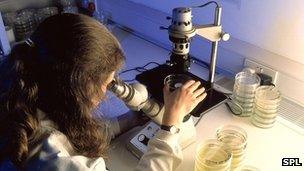New £90m lab opens at Southern General Hospital in Glasgow
- Published

The lab will produce tens of thousands of results each day
Scotland's largest health board has opened a new £90m laboratory in Glasgow to handle the majority of its research, diagnoses and treatment work.
NHS Greater Glasgow and Clyde (GGC) has centralised most of its lab services at the Southern General Hospital facility.
It features a genetics laboratory and blood sciences department.
More than 800 staff will help process results from hospitals in the health board area and undertake research towards developing new treatments.
The lab is just one part of the £842m new Southern General campus, which will see an integrated children's and adult hospital built on the site of the current Southern General.
'Faster diagnostic tests'
The new hospital will have 1,109 adult beds, 256 children's beds and provide maternity, paediatric and acute services.
The new £90m lab was opened on Wednesday by Health Secretary Alex Neil.
"This new facility will bring together a whole range of laboratory services under one roof and provide NHS Greater Glasgow and Clyde with a modern purpose-built facility which will play a key role in supporting the New South Glasgow Hospitals Campus site," he said.
"In addition, it will bring real benefits for patients, by providing faster diagnostic tests through the development of pioneering medical breakthroughs.
"Centralising services for all ages on a single site will ensure that everyone can access the widest possible range of specialist services and will also bring with it increased efficiency, shorter waiting times and better care."
The new lab's genetics laboratory is developing tests to allow treatments to be tailored to a patient's DNA makeup.
Its blood sciences department will handle a wide-range of analytical tests on blood samples, and a range of tests to aid diagnosis.
Andrew Robertson, chairman of NHS GGC, said: "The new laboratory building is the first stage of a building programme that will transform the Southern General campus into a world class facility.
"It has been delivered on time and within budget and has created a multi-disciplinary approach to laboratory medicine which will benefit patients now and in the future."
Rachel Green, associate medical director for diagnostics, added: "The magnitude of the operation at this fine building is immense and should not be under-estimated.
"More than 800 people have relocated to this new laboratory and tens of thousands of results are being generated every single day to support faster turnaround times, improving our diagnostic capacity for the patients we treat."
- Published9 August 2012